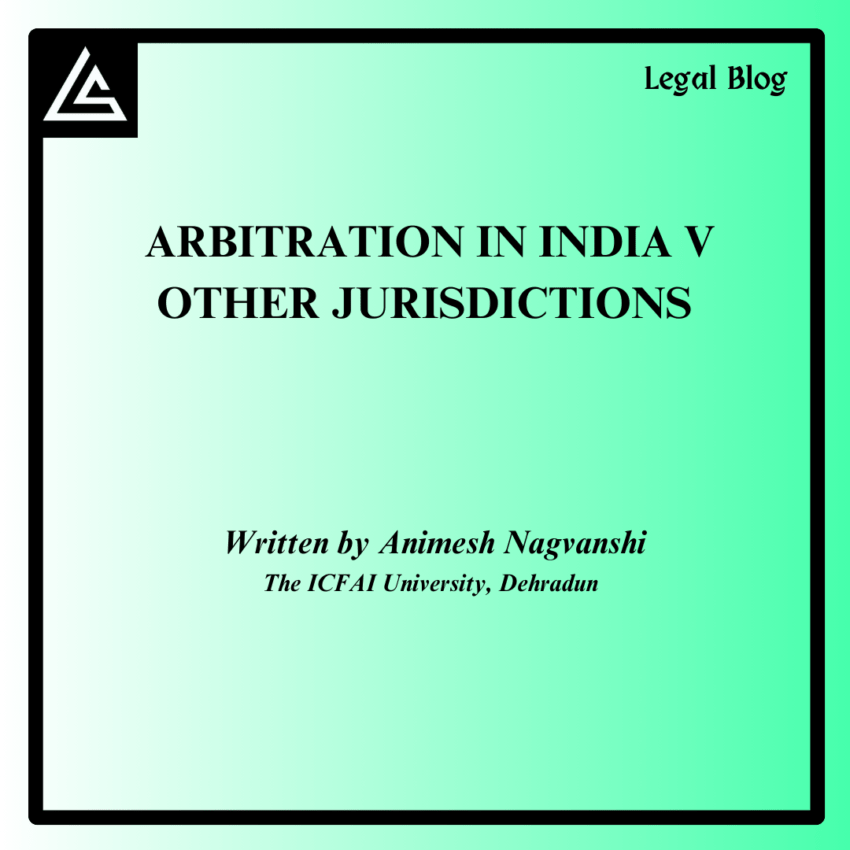Table of Contents
INTRODUCTION
Arbitration is the preferred means of settling commercial disputes because it is more efficient, discreet, and flexible than traditional court action. However, arbitration methods varied greatly among nations. This blog examines the arbitration scene in India and compares it to processes in other major jurisdictions such as the United States, the United Kingdom, and Singapore.
ARBITRATION IN INDIA
Arbitration in India has grown significantly in recent decades, driven by the desire to resolve economic disputes promptly and efficiently. The Arbitration and Conciliation Act of 1996[1], which is based on the UNCITRAL Model Law, controls arbitration in India. Amendments in 2015 and 2019 sought to simplify arbitration processes, eliminate judicial interference, and ensure quick conflict settlement.
KEY FEATURES OF INSTITUTIONAL AND AD HOC ARBITRATION IN INDIA:
Ad Hoc Arbitration: In India, ad hoc arbitration, in which the parties administer the arbitration process themselves without the assistance of an institution, has traditionally been the norm. This frequently results in inefficiencies and delays owing to a lack of procedural clarity.
Institutional arbitration is becoming increasingly popular, and it is governed by established arbitration institutions such as the Indian Council of Arbitration (ICA), the Mumbai Centre for International Arbitration (MCIA), and the Delhi International Arbitration Centre (DIAC). These organizations offer a systematic process, skilled arbitrators, and administrative assistance, resulting in more rapid conflict settlement.
JUDICIAL INTERVENTION
Despite efforts to reduce court intrusion, Indian courts continue to play an important role, particularly in awarding interim relief, selecting arbitrators, and contesting arbitral rulings. The Arbitration Act modifications were meant to minimize excessive judicial interference, but their practical execution varied, with courts occasionally overstepping their intended narrow role.
EXECUTION OF AWARDS
India has signed the New York Convention on the Recognition and Enforcement of Foreign Arbitral rulings, which makes it easier to enforce international arbitration rulings. However, procedural delays and court scrutiny can complicate enforcement, making the procedure lengthy.[2]
ARBITRATION IN THE UNITED STATES
Arbitration is commonly utilized in the United States, especially for commercial and consumer disputes. The Federal Arbitration Act (FAA) oversees arbitration on a federal level, providing a strong foundation for enforcing arbitration agreements and verdicts.
Key aspects of arbitration in the United States include:
- Broad application: The FAA promotes the broad application of arbitration provisions, which frequently results in the implementation of obligatory arbitration agreements in employment, consumer, and business contracts.
- Limited Judicial Review: Courts in the United States have limited involvement in reviewing arbitral verdicts, with grounds for overturning awards being restricted and rigidly defined.
- Institutional Arbitration: Institutions such as the American Arbitration Association (AAA) and the International Centre for Dispute Resolution (ICDR) provide organized arbitration services, which contributes to institutional arbitration’s popularity.[3]
ARBITRATION IN THE UNITED KINGDOM
The United Kingdom is a significant international arbitration hub, thanks to the London Court of International Arbitration (LCIA) and the English Arbitration Act of 1996, which creates an arbitration-friendly climate.
Arbitration in the UK has the following key features:
- Party Liberty: The Arbitration Act of 1996 stresses party autonomy by allowing parties to modify arbitration processes to their requirements.
- Minimum Court Assistance: UK courts have a hands-off policy, intervening only in extreme circumstances to facilitate the arbitration process.
- Execution of rulings: The UK is also an adherent to the New York Convention, which makes it easier to enforce international arbitral rulings.[4]
ARBITRATION IN SINGAPORE.
Singapore has quickly evolved as a worldwide arbitration hub, with the Singapore International Arbitration Centre (SIAC) playing a key role. The Singapore International Arbitration Act and the UNCITRAL Model Law establish a complete legal framework for arbitration.
Key characteristics of arbitration in Singapore include:
- Convenience and Competence: Singapore is well-known for its efficient handling of arbitration disputes, as well as a judicial system that is knowledgeable about arbitration law.
- Pro-Arbitration Position: The Singaporean legal system strongly favours arbitration, with little judicial participation and a focus on quick conflict settlement.
- International Identification: SIAC’s reputation and Singapore’s strategic position make it a popular choice for international arbitration, particularly for conflicts involving Asian parties.[5]
COMPARATIVE ANALYSIS
While India has made tremendous achievements in promoting arbitration, there are still difficulties in decreasing court interference and increasing award enforcement. In contrast, nations such as the United States, United Kingdom, and Singapore have more mature and arbitration-friendly conditions, with limited judicial involvement, fast processes, and strong institutional backing.
- Judicial interference: The US, UK, and Singapore have frameworks that limit judicial interference, but India is still attempting to achieve this balance.
- Institutional Support: The establishment of powerful arbitration institutions such as AAA (US), LCIA (UK), and SIAC (Singapore) improves the efficiency and credibility of arbitration. India is creating its institutional structure, although it is not yet fully developed.
- Award enforcement is often easier in the United States, United Kingdom, and Singapore, however, India confronts practical problems despite being a New York Convention signatory.[6]
CONCLUSION
Arbitration processes differ greatly between nations, affected by legislative frameworks, institutional support, and judicial perspectives. India’s attempts to improve its arbitration environment are admirable, but further changes are required to meet the efficiency and dependability found in countries such as the United States, United Kingdom, and Singapore. Understanding these distinctions is critical for parties involved in international trade when deciding on a suitable venue and arbitration system.
[1] The Arbitration and Conciliation Act, 1996, No. 26, Act of Parliament, 1996 (India)
[2] Cyril Amarchand Mangaldas (https://www.cyrilshroff.com/wp-content/uploads/2019/06/Arbitration-in-India-%E2%80%93-A-Story-of-Growth-and-Opportunity.pdf) (Last Visited on 27th June, 2024)
[3] Foley Hoag LLP (https://foleyhoag.com/getattachment/ec0b0340-763b-4b3b-beb0-4cadc75495cb/Bard1.pdf?lang=en-US) (Last visited on 27th June, 2024)
[4] Practical Law (https://uk.practicallaw.thomsonreuters.com/4-502-1378?transitionType=Default&contextData=(sc.Default)) (Last Visited on 27th June, 2024)
[5] Clyde & Co (https://www.clydeco.com/en/insights/2023/10/the-landscape-of-arbitrators-in-singapore) (Last Visited on 27th June, 2024)
[6]iPleaders (https://blog.ipleaders.in/arbitration-laws-around-world-comparison-different-countries/) (Last Visited on 27th June, 2024)
Author :- Animesh Nagvanshi
The ICFAI University, Dehradun
share this post on

